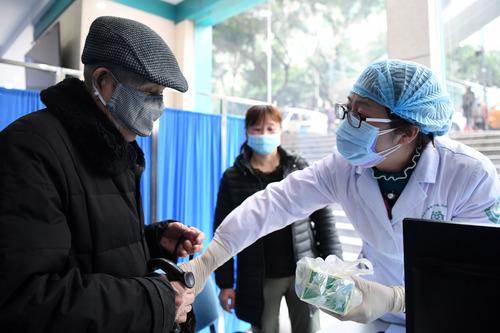BEIJING, March 31 (Xinhua) -- China has attached great importance to prevention and control measures against COVID-19 in civil affairs service facilities, and highlighted the protection of the elderly population that shows higher vulnerability to the virus due to weaker immunity and preexisting medical conditions.
In a circular issued by the joint prevention and control mechanism of the State Council, such facilities are called to guard against "cluster of infections" through entry-exit management among staff and residents, reinforcing medical and nursing personnel, preparing more prevention and control materials and supervising the protective measures of their staff and residents such as wearing masks and hand hygiene.
As more and more experts worldwide calling for clearer and better measures to support the older generation in this global fight, some of China's guideline and measures on elderly population protection are provided below to help address this issue.
Highlights:
Differentiated and targeted approaches based on locations and epidemic condition
Prevention and control work conducted in coordinated manner by various departments and institutions
Housebound Elderly
Enhance self-protection awareness and scientific understanding of the disease among the elderly by promoting such knowledge through multiple means such as media, internet and door-to-door service.
Significantly cut outdoor activities and self-protection stressed for must-go-out scenarios
All localities and relevant departments should collect full information on living-alone, empty-nested, left-behind, disabled elderly as well as those suffering from a variety of chronic diseases, while keep good track on elderly health status and health management.
The huge wave of home returning migrant workers poses great threat to the elderly in rural areas where epidemic prevention and control for the elderly should be highlighted and grassroots organizations and village doctors should come into full play.
Community Elderly
Enhance epidemic prevention and control knowledge among service staff at elderly activity rooms, elderly day care institutions, elderly canteens, elderly universities and other community-based locations, as well as institutions that serve the elderly for housekeeping, meal assistance and cleaning. Service staff should help the elderly better protect themselves along their own self-protection.
Avoid gathering and group activities among the elderly as much as possible.
Attach great importance to disinfection and air purification at community elderly activity facilities and elderly service providing organizations.
Ensure medical care and protective material supply for the elderly. Community medical and health institutions should transfer elderly patients to designated hospitals as soon as symptoms such as fever is detected.
Institutionalized Elderly
Prevention and control measures should be strictly carried out in elderly rehabilitation and nursing facilities to reduce infection among institutionalized elderly.
Screening, detection, registration and information reporting and processing work should proceed under the guidance of disease control and prevention institutions.
Pneumonia-like suspected cases should be transferred to a designated hospital.
Medical institutions should provide technical guidance to contracted elderly institutions and ensure preferential and "green pass" treatment for the elderly.
Provide prevention and control information and knowledge in elderly care institutions and provide guidance on self-protection, good hygiene and health habits.
Strengthen psychological adjustment by relieving anxiety and fear
Educate a healthy living routine and lifestyle
Suspend all gathering activities
Strict disinfection
Keep environment clean and pay attention to garbage and sewage treatment
Timely procurement and distribution of protective supplies
For epidemic hard-hit areas, special facilities such as medical observation rooms, quarantine areas and disinfection rooms should be established besides basic prevention and control materials.
Closed-off management could be carried out for nursing institutions where visiting and admission of new elderly would be suspended.
Check previous living condition and health status for back-to-nursing elderly people, and for those who have contacts with epidemic-influenced people or confirmed patients, quarantine is needed.
Strict monitoring and reporting
Register elderly that shows symptoms such as fever, cough, fatigue and keep information such as date, names, gender, age, activity span and body temperature on record
Quarantine and observation on close contacts
Hospitalization is a must for any abnormal symptoms, and any medical institutions should not refuse confirmed or suspected cases for any reason and should try everything to keep them safe and healthy.
Prevention and control preparation is a must among personnel before carrying out nursing work and disinfection should be carried out during their service.
Intensify support and supervision
Joint and coordinated prevention and control work among different departments and organizations
Territorial jurisdiction responsibilities.
Overall arrangements for prevention and control materials and financial support for the elderly institutions in each jurisdiction
Encourage the participation of elderly care related organizations and voluntary service organizations in epidemic prevention and control efforts to assist elderly group in terms of self-protection, mental support and health guidance
Health administrative departments at all levels should strengthen the supervision and inspection of the epidemic prevention and control work for the elderly, promptly rectify and correct the problems unearthed, and continuously improve the epidemic prevention and control quality and capabilities.
(Edited by Niu Huizhe, Wu Shuang with Xinhua Silk Road, niuhuizhe@xinhua.org)




 A single purchase
A single purchase









